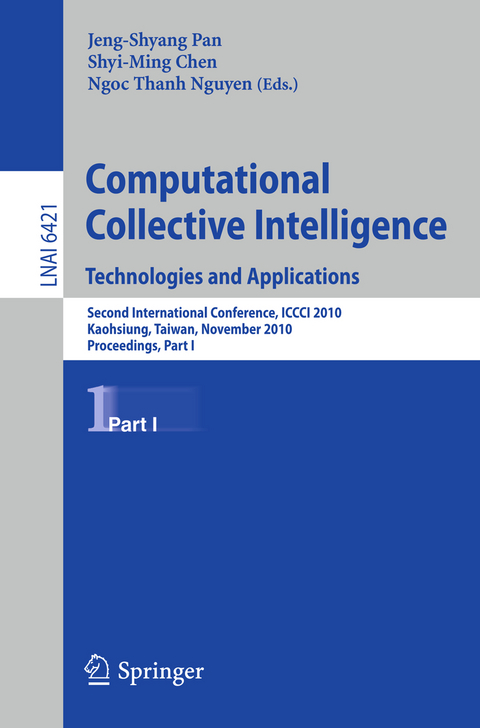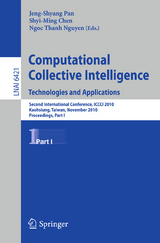Computational Collective Intelligence. Technologies and Applications
Springer Berlin (Verlag)
978-3-642-16692-1 (ISBN)
Collective Intelligence in Web Systems - Web Systems Analysis.- Neuro-Fuzzy Models in Global HTTP Request Distribution.- Real Anomaly Detection in Telecommunication Multidimensional Data Using Data Mining Techniques.- Time Series Forecasting of Web Performance Data Monitored by MWING Multiagent Distributed System.- Comparison and Analysis of the Eye Pointing Methods and Applications.- Abstraction Relations between Internal and Behavioural Agent Models for Collective Decision Making.- Quick Response System Using Collaborative Filtering on Fashion E-Business.- Intelligent Computing for Data Security.- An Ownership Verification Scheme by Using Image Pinned Field and Genetic Algorithm.- Multiple-Image Multiplexing Encryption Based on Modified Gerchberg-Saxton Algorithm and Phase Modulation in Fractional Fourier Transform Domain.- Optical Image Encryption Based on Joint Fresnel Transform Correlator.- Communication and Trust in the Bounded Confidence Model.- Detection of Image Region-Duplication with Rotation and Scaling Tolerance.- Smart Clustering Techniques.- An Extensible Particles Swarm Optimization for Energy-Effective Cluster Management of Underwater Sensor Networks.- The 3D Display and Analysis of the Pattern of Photolithography.- Geometrically Invariant Image Watermarking Using Scale-Invariant Feature Transform and K-Means Clustering.- DenVOICE: A New Density-Partitioning Clustering Technique Based on Congregation of Dense Voronoi Cells for Non-spherical Patterns.- Semantic Search Results Clustering.- Trend Detection on Thin-Film Solar Cell Technology Using Cluster Analysis and Modified Data Crystallization.- Quality of Semantic Compression in Classification.- Web Service.- Realizes Three-Tier Structure Mail System Based on the Web.- Secure Collaborative CloudDesign for Global USN Services.- Mining on Terms Extraction from Web News.- Inter-cloud Data Integration System Considering Privacy and Cost.- A Semantic Web Approach to Heterogeneous Metadata Integration.- Quantitative Management of Technology (I).- Fuzzy Multi-objective Programming Application for Time-Cost Trade-off of CPM in Project Management.- A Study on Two-Stage Budget Planning by Fuzzy Quantifying Analysis.- Hybrid Support Vector Regression and GA/TS for Radio-Wave Path-Loss Prediction.- Inventory Model with Fractional Brownian Motion Demand.- Note on Inventory Model with a Stochastic Demand.- A GA-Based Support Vector Machine Diagnosis Model for Business Crisis.- Agent System.- A Book-Agent System for Library Marketing.- Adaptive Modelling of Social Decision Making by Agents Integrating Simulated Behaviour and Perception Chains.- Modeling Agent-Based Collaborative Process.- A Three-Dimensional Abstraction Framework to Compare Multi-Agent System Models.- Improving Performance of Protein Structure Similarity Searching by Distributing Computations in Hierarchical Multi-Agent System.- Modeling Super Mirroring Functionality in Action Execution, Imagination, Mirroring, and Imitation.- CCI-Based Optimization Models.- Cellular GEP-Induced Classifiers.- Cluster Integration for the Cluster-Based Instance Selection.- Comparative Study of the Differential Evolution and Approximation Algorithms for Computing Optimal Mixed Strategies in Zero-Sum Games.- Ant Colony Decision Trees - A New Method for Constructing Decision Trees Based on Ant Colony Optimization.- A Cross-Entropy Based Population Learning Algorithm for Multi-mode Resource-Constrained Project Scheduling Problem with Minimum and Maximum Time Lags.- Evaluation of Agents Performance within the A-Team SolvingRCPSP/Max Problem.- Synchronous vs. Asynchronous Cooperative Approach to Solving the Vehicle Routing Problem.- Quantitative Management of Technology (II).- Development of an Engineering Knowledge Extraction Framework.- Exploring EFL Taiwanese University Students' Perceptions of a Collaborative CALL Environment.- Performance Evaluation of Telecommunication Industry between China and Taiwan.- Discuss and Analyze by AHP Techniques the KSF of Managing the NMMBA under the BOT Model.- A DEA Application Model of Production Process for the Chip Resistor Industry.- Enhancing Repair Service Quality of Mobile Phones by the TRIZ Method.- Fuzzy Logic and Its Applications.- Adaptive Learning Approach of Fuzzy Logic Controller with Evolution for Pursuit-Evasion Games.- Comparison of Multispectral Image Processing Techniques to Brain MR Image Classification between Fuzzy C-Mean Method and Geodesic Active Contours of Caselles Level Set Method.- Modeling PVT Properties of Crude Oil Systems Using Type-2 Fuzzy Logic Systems.- An Extensional Signed Fuzzy Measure of Signed Rho-Fuzzy Measure.- Adaptive Fuzzy Neural Network Control for Automatic Landing System.
| Erscheint lt. Verlag | 21.10.2010 |
|---|---|
| Reihe/Serie | Lecture Notes in Artificial Intelligence | Lecture Notes in Computer Science |
| Zusatzinfo | XXVII, 534 p. 217 illus. |
| Verlagsort | Berlin |
| Sprache | englisch |
| Themenwelt | Informatik ► Theorie / Studium ► Künstliche Intelligenz / Robotik |
| Schlagworte | Algorithm analysis and problem complexity • Artificial Intelligence • authorization • classification • Cognition • collective intelligence • Data Mining • E-Learning • Framework • Fuzzy Logic • Genetic Algorithm • Heuristics • Image Analysis • Knowledge • Knowledge-based systems • Modeling • Optimization • pattern recognition • Programming language • semantic web • Social Networks • Web Services • wireless sensor networks |
| ISBN-10 | 3-642-16692-X / 364216692X |
| ISBN-13 | 978-3-642-16692-1 / 9783642166921 |
| Zustand | Neuware |
| Haben Sie eine Frage zum Produkt? |
aus dem Bereich




